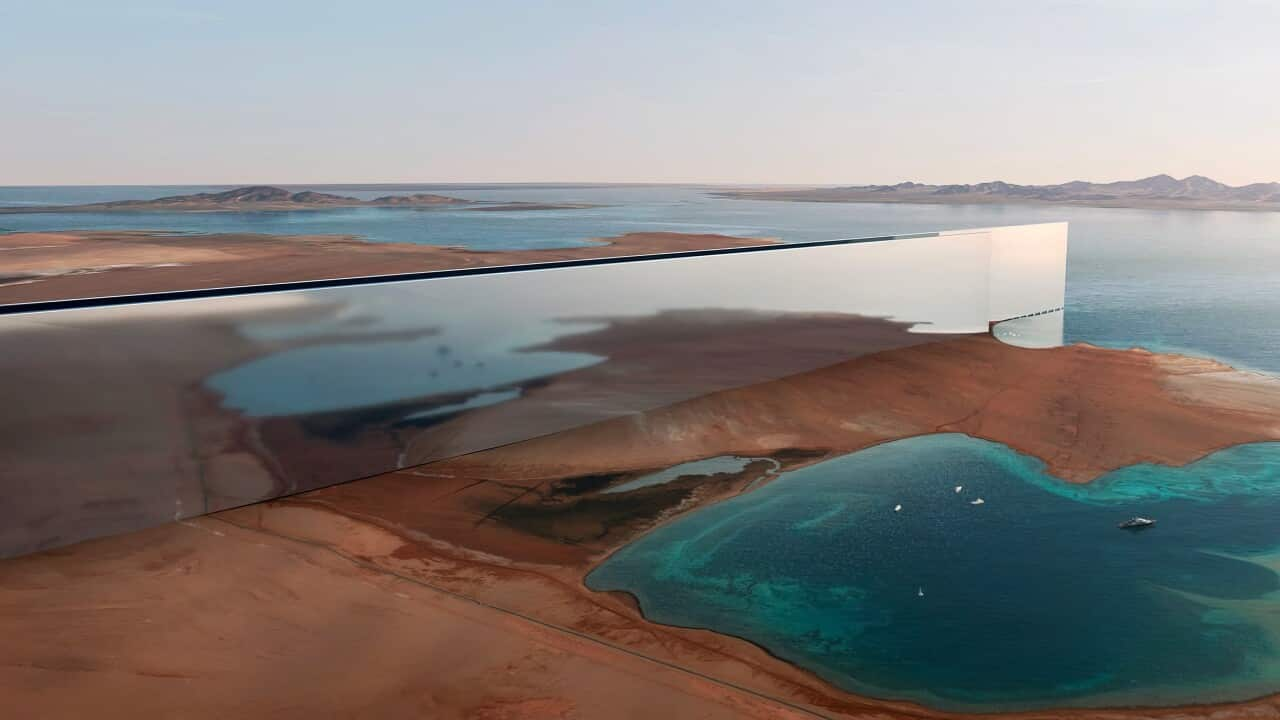Key Points
- Neom is said to be the brainchild of Saudi Arabia's Crown Prince Mohammed bin Salman.
- MBS claims Neom will have the capacity to accommodate 450,000 people by 2026 and nine million by 2045.
- Critics says human rights are being abused.
It’s been marketed as a “civilisational revolution that puts humans first”.
But Saudi Arabia is facing accusations that people who are being displaced by its ambitious Neom project are not just being put last, they're also facing death sentences.
Neom - said to be the brainchild of Saudi Arabia's Crown Prince Mohammed bin Salman (MBS) - is a futuristic mega-city planned for construction in northwestern Saudi Arabia.
It will consist of three regions including The Line - a 'smart city' encased in mirrored walls that designers say will run on 100 per cent renewable energy, with no streets and no cars.
Described as "a civilisational revolution that puts humans first", The Line will extend for 170km and promises residents they'll be able to travel on public transport from one end of the city to the other in 20 minutes. All amenities would be available within a five-minute walk.
MBS claims Neom will have the capacity to accommodate 450,000 people by 2026 and nine million by 2045.
Human rights groups have claimed there have been forced evictions of some members of the Huwaitat tribe, and that a number of tribespeople opposing the evictions have been killed.
SBS News contacted Neom and Saudi Arabia's embassy in Australia for comment and did not receive a reply.
Ali Shihabi, a member of the project's Advisory Board, told The Guardian that displaced members of the tribe would be compensated, adding: “Practice in Saudi has been that people have to accept it, and have usually done so because the government has a tradition of compensating generously.”
Claims of shootings and executions
According to Saudi Arabia-focused human rights organisation ALQST, three members of the Huwaitat tribe were sentenced to death last year for opposing evictions in 2020.
The NGO says the trio - Shadli, Ibrahim and Ataullah al-Huwaiti - were arrested as a result of their "peaceful opposition" to forced evictions and resident displacement by the state-led Neom project.
The group says their case was dealt with in Saudi Arabia’s Specialised Criminal Court, which was set up to handle terrorist cases.
ALQST's head of events Abdullah Aljuraywi said the sentences were "shocking" and members of the tribe were "legitimately protesting against forced eviction from their homes".

An artist's impression of what those behind the Neom project propose life within The Line will look like. Source: Supplied / neom.com
Transparency and political suppression
Ben Rich, senior lecturer in international relations and history at Curtin University, said Saudi Arabia's courts exist to create "the illusion of due process", adding that the number of people being executed in the country in recent years had "risen dramatically" and so had political suppression.
“It's not just in the case of Neom, it’s all sorts of different political activists and people that are claimed to be terrorists by the state," he said.
Separately, Human Rights Watch has cited concerns about the use of digital technology to surveil future residents of The Line.
Neom's head of technology has reportedly said while smart cities currently used about one per cent of available data, it was anticipated Neom would make use of 90 per cent of the "community's information".
Saudi Arabia has in the past been accused of monitoring dissidents' mobile phones with surveillance malware.
The influence of Crown Prince Mohammed bin Salman
Mr Rich said much of the increased suppression within Saudi society had occurred alongside MBS's rise to power.
His ascent began in 2015 when was named the country’s minister for defence after his father became king.
King Salman made changes to the way the succession process operated, allowing his son to rise through the line of succession and become the crown prince and deputy prime minister.
In recent years, he has been portrayed as the country's de facto ruler.
“The Saudis have always governed through authoritarianism, but it's what many scholars of the region ... describe as a soft authoritarianism," Mr Rich said.
“The Crown in Saudi Arabia historically was not so much of the tyrannical despot, it was more of a case of them ruling with a kind of council of elites around them.

Neom is part of Saudi Arabian Crown Prince Mohammed bin Salman's future vision for the country. Source: Getty / Anadolu Agency/Anadolu Agency via Getty Images
While doing this, he made changes within society such as allowing women to drive cars, and unveil if they wanted to.
“But at the same time, he was doing this, he was also locking up women, political dissidents who you would think their interests would kind of be aligning," Mr Rich said.
"This has only escalated to this strange kind of paradoxical set of policies.
"He's trying to present the kingdom as kind of liberalising, opening up, providing greater degrees of freedom to the citizens, but on the other end of the spectrum, anyone who's been agitating for this historically are seen as a threat and cracked down on, in extremely suppressive and often violent terms.”











